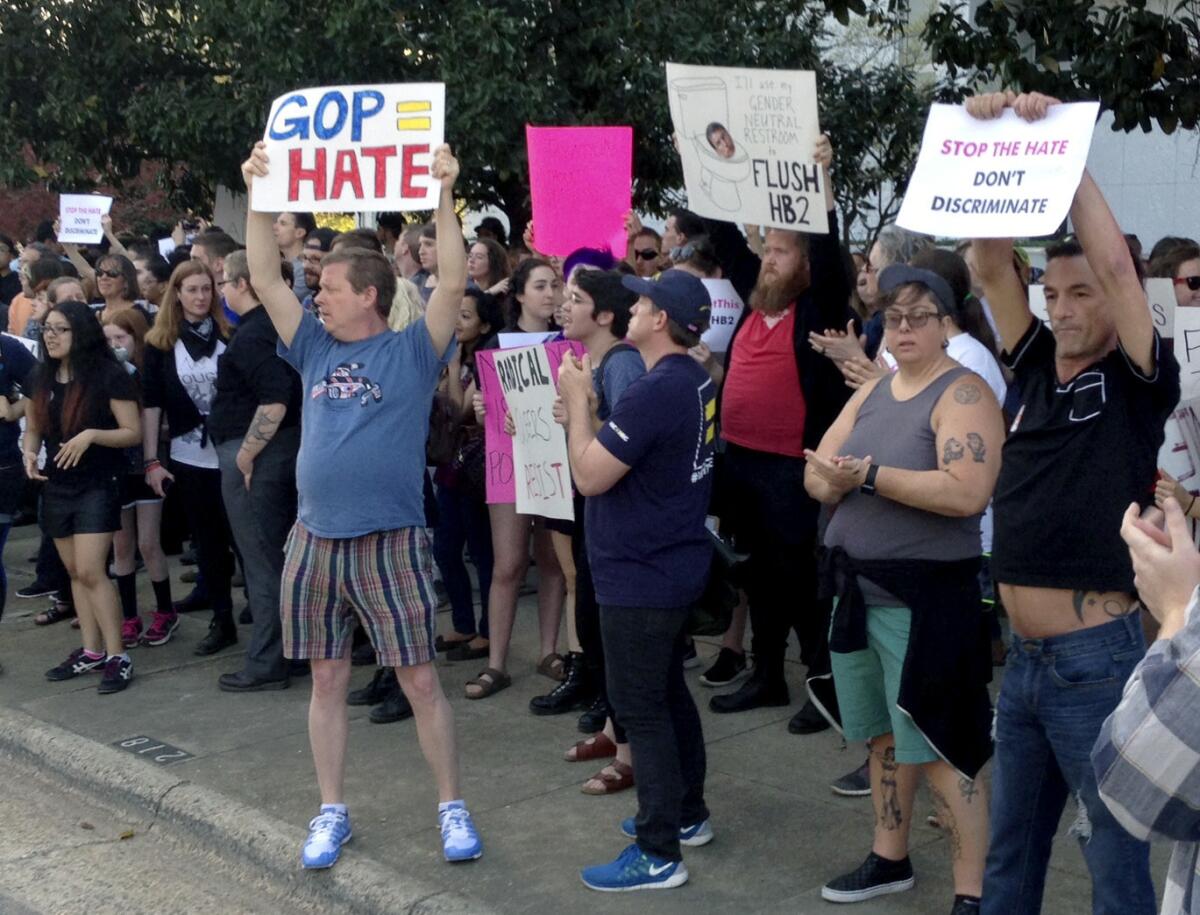Opinion: LGBT rights are being stripped away across the U.S. Here’s how Democrats can stop it

People protest outside the North Carolina Executive Mansion in Raleigh on March 24. A new North Carolina law repeals local nondiscrimination ordinances in the state.
Across the country, the rights of transgender Americans are under attack.
Last week, North Carolina passed a bill that repealed local nondiscrimination ordinances in the state. The legislation, House Bill 2, was pushed through in an “emergency session.” HB 2 was signed by North Carolina Gov. Pat McCrory the very same day. In a statement, McCrory argued that the bill was necessary in preventing “government overreach” from local municipalities. He was more than likely referring to the Charlotte City Council’s 7-4 vote in February to extend its existing nondiscrimination statutes to include its transgender residents. The measure provided equal access to all public accommodations, including public bathrooms, museums and restaurants.
North Carolina’s decision to repeal the Charlotte law makes it effectively illegal for transgender people to use the restroom that corresponds most closely with their gender identity. The Tar Heel state is far from the only one to consider restricting the rights of transgender folks. Eight other states are mulling bathroom bills strikingly similar to the one North Carolina just passed. These include Illinois, Missouri, Kansas and Kentucky. Just 18 states (and Washington, D.C.) have laws on the books that grant transgender people the legal right to affirming bathroom access.
That needs to change. And a bill introduced to Congress last year could offer exactly the kind of protections the LGBT community needs right now. The Equality Act of 2015 would amend the Civil Rights Act to include protections on the basis of gender identity and sexual orientation. In its current form, the 1964 Civil Rights Act only forbids employment discrimination on the basis of race, gender, religious affiliation and country of origin. The Equality Act would expand those protections to the LGBT community, in addition to covering housing, public education, federal funding and public accommodation. President Obama endorsed the bill last year.
It’s time for legislators in Congress to follow the president’s lead.
Federal protections for the LGBT community are widely popular with the American public: A 2015 poll from UCLA’s Williams Institute showed that an overwhelming majority of respondents (78%) supported nondiscrimination laws for LGBT people. In fact, many American assume such protections already exist: A 2014 survey from the Huffington Post and YouGov showed that 62% of likely voters thought that it was “currently illegal under federal law to fire someone for being gay or lesbian.”
That is far from the case: Last year, the Western District Missouri Court of Appeals sided with Cook Paper Recycling Corp in a dispute with James Pittman, a former employee who detailed an “objectively hostile and abusive environment.” Pittman’s co-workers repeatedly bashed him with crude slurs asked him if he had AIDS. When he spoke up to management about these issues, he was ultimately dismissed by the company. Similar incidents have occurred in Tennessee, Texas, Virginia, Massachusetts, Minnesota, Ohio and New York.
Sadly, this bill appears to be dead in the water under the current Republican-controlled Congress. The conservative Heritage Foundation has already spoken out about the Equality Act, saying it amounts to “special privileges” for LGBT people. In January, the GOP drafted a resolution to back anti-transgender bathroom legislation across the U.S., arguing that these bills protect individual privacy. The statement was endorsed by Reince Priebus, chairman of the Republican National Convention.
Despite Republican obstructionism in Congress, some red states have recently voted down efforts to restrict the rights of LGBT people. After companies such as Disney, Marvel and Apple threatened to boycott Georgia, Gov. Nathan Deal vetoed a “religious freedom” bill passed by his state’s House and Senate. It was nearly identical to the one Indiana repealed last year.
These successes are heartening, but the humanity of LGBT people shouldn’t be left up to the whims of Republican state officials. Since the passage of North Carolina’s law, Mississippi looks poised to be the next state to pass anti-LGBT legislation, as a “religious freedom bill” awaits a signature from the state’s conservative governor, Phil Bryant. In an interview last week, Bryant suggested that he was inclined to approve the legislation, which will make it legal for businesses to fire someone or deny them service for their sexual orientation or gender identity. Without comprehensive action, this pattern of hate will keep repeating itself.
The American public already has already shown that it is against these bills and that it supports the rights of LGBT individuals. It’s time for our federal government to do the same in pushing for the Equality Act. Presidential candidate Hillary Clinton has already endorsed the bill, calling its passage her “highest priority” should she be voted in this November. Despite her stated support, LGBT protections have largely remained a nonissue this campaign season. If the Equality Act faces a tough battle in Congress, Democratic candidates must start fighting for its adoption now.
With each new piece of anti-LGBT legislation that’s introduced, a sweeping solution at the national level is increasingly necessary to stop the further erosion of basic civil rights across the country.
Nico Lang is the East Coast reporter for the Advocate. You can also read his work on Salon, Onion A.V. Club and the Guardian. Find him on Twitter @nico_lang.
Follow the Opinion section on Twitter @latimesopinion and Facebook
More to Read
A cure for the common opinion
Get thought-provoking perspectives with our weekly newsletter.
You may occasionally receive promotional content from the Los Angeles Times.






